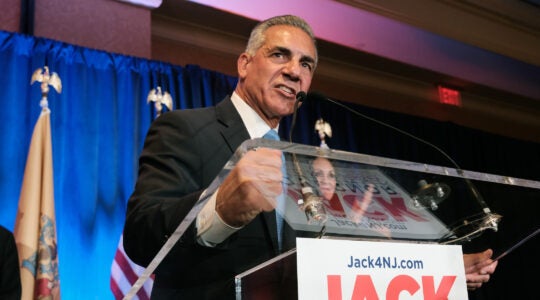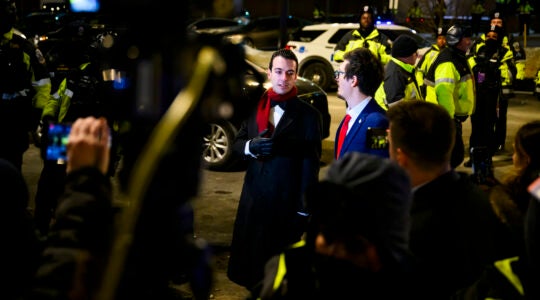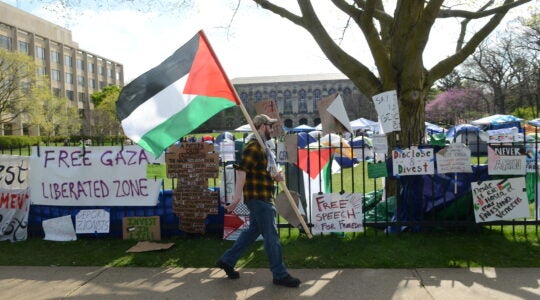NEW YORK (JTA) – “I worked all my life for this house,” Daniel Okonsky said in a call from his cell phone on Tuesday afternoon. “I was able to build it, to maintain it – and now there is nothing.”
Okonsky was speaking from the Downtown Sheraton in San Diego, where he has been staying with his family since they evacuated their home Sunday at 3:30 a.m. in the face of wildfires that have ravaged southern California.
As of Wednesday afternoon the disaster had turned some 679 square miles from San Diego to northern Los Angeles into a rumbling inferno, forcing 950,000 people to evacuate and destroying an estimated 1,500 homes, including Okonsky’s.
As the region deals with the fires, the Jewish community of nearly three quarters of a million people in San Diego and Los Angeles counties is struggling to assess the damage in its own ranks.
San Diego County, with about 100,000 Jews, has been hardest hit, with 14 separate fires raging. About 350,000 people have been evacuated from their homes.
It is unknown how many of the evacuees are Jewish, but 30 communal leaders met via teleconference on Tuesday to discuss the situation.
The Lawrence Family Jewish Community Center in La Jolla has been evacuated and has incurred some smoke damage, according to Michael Sonduck, chief operating officer of the United Jewish Federation of San Diego County.
The residents of the Jewish Sea Crest retirement villages in Rancho Bernardo and Encinitas were voluntarily evacuated.
Two of the area’s 40 synagogues were evacuated, and a number remain in fire zones, but it is still not known whether any of them have been damaged, according to Sonduck.
The federation, the Jewish Community Foundation and the Jewish Family Service of San Diego have set up a disaster fund to help assist with relief.
“San Diego is our big concern,” Rabbi Mark Diamond, executive vice president of the Board of Rabbis of Southern California, told JTA. The fund collected $35,000 in its first day.
The United Jewish Communities, the umbrella organization for the North American federation system, has set up the UJC/Federation Wildfire Relief Fund, which will include a mailbox for accepting checks and an online donation form to help victims in the Jewish and general population.
All of the funds collected will go the Jewish Federation of Greater Los Angeles, the Jewish Federation of Orange County and the United Jewish Federation of San Diego County, whose communities have been affected. No administrative costs will be deducted.
Much of Diamond’s job right now is making contact with the 290 rabbis from San Diego to San Luis Obispo who make up his board and trying to figure out how their synagogues can help each other. If congregants require housing or need to replenish Jewish supplies such as prayer books, the Board of Rabbis will step in, he said.
Even as they worry about their own synagogues, some Jews have reached out to the broader community.
When the Malibu Presbyterian Church burned down Monday, the Reconstructionist Malibu Jewish Center and Synagogue offered to house the church’s preschool for several months, Diamond said.
And in San Diego, Chabad-Lubavitch has been delivering blankets and food to the 10,000 evacuees staying at Qualcomm Stadium, home of the NFL’s San Diego Chargers. Chabad is delivering kosher food to Jews and non-kosher food donated from local restaurants to non-Jews, said the rabbi of Chabad of Poway, Yisroel Goldstein.
“The wildfires know no bounds of geography or religious faith,” Diamond said.
The area’s largest Jewish community, in and around Los Angeles, where some 550,000 Jews live, seems relatively unscathed so far, according to officials at the Jewish Federation of Greater Los Angeles.
The Jewish community in Orange County, south of Los Angeles, has also been relatively unharmed, according to Chelle Friedman, director of the planning and funding council for the Jewish Federation of Orange County.
Though the Jewish Community Center in Orange County has cancelled all outdoor activities, the federation there has received no reports of damage to any of the area’s 37 synagogues, three day schools, or other Jewish institututions.
“So far we have been very fortunate,” Friedman told JTA.
But community officials are not resting comfortably, she said, because “the winds could shift at any moment.”
The real horror remains south, where the past few days have been harrowing, say those still in the fire.
“It is like a war zone,” said Okonsky, who lost the 6,500-sq.-ft .home he built 16 years ago on 3.25 acres overlooking a canyon and bird sanctuary.
Okonsky, a member of the Chabad of Poway, was awakened by authorities at 3:30 a.m. with word that he had to evacuate. Several minutes later a blackout followed.
Scrambling in the dark, Okonsky was able to grab only a couple of family photos off the walls as he rushed his three sons out of their home. They took refuge at his parents’ home in Rancho Bernardo, just north before they had to evacuate there at 6 a.m.
The region’s 14 Chabad houses have acted as something of a telephone line of shelters, Goldstein said. One Chabad will open a shelter, offering food and refuge, and as soon as that house is told to evacuate, another Chabad in a safe area opens its doors.
“We had 200 people in our shul early Sunday morning” before they had to evacuate, he said.
But the real work will start when people who have lost everything, like Okonsky, start to rebuild.
When he returned to his home Monday there was nothing left, just flames shooting from a gas line in the house’s foundation that firefighters had not shut down.
Okonsky has notified his insurance company of the loss but is not sure what will happen next.
“I have never lived through something like this,” he said. “I have no procedure to follow. It’s not something you expect every day. You have a house where you raise a family and now there is nothing left.”
For more information on the UJC/Jewish Federations of North America Wildfire Relief Fund, visit www.ujc.org/wildfirerelief.Information about the San Diego relief fund can be found at jewishinsandiego.org.
JTA has documented Jewish history in real-time for over a century. Keep our journalism strong by joining us in supporting independent, award-winning reporting.





